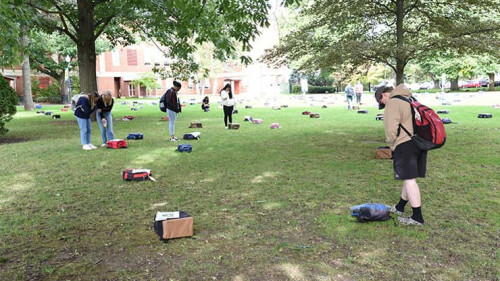
By Eric Guzman '12
As we prepare to recognize the 150th anniversary of the Civil War, Siena's History Department invited Stephenson Distinguished Lecturer at the University of North Carolina at Chapel Hill Joseph Glatthar, Ph.D. to share his research. Glatthar uses military history to understand certain aspects of society and culture. He has recently become intrigued by the idea of employing qualitative and quantitative evidence to help understand important aspects of the Civil War.
“It is important to celebrate all of those involved in the Civil War,” said Siena College Associate Professor of History Bruce Eelman, Ph.D. “Fortunately, the discipline of history has advanced since then and we now know much more about the event.”
Glatthar’s presentation shed light on the role of African Americans in the Civil War. He discussed the challenges they faced and their struggles after the war was over.
“When the war broke out, many African Americans viewed this as an opportunity to break from slavery and gain equal rights in society,” said Glatthar. “More than 170,000 black soldiers served in the Union Army and another 20,000 served for the Union Navy.”
Despite their service to preserve the Union and end slavery, black soldiers still found themselves unequal to their white comrades. Excessive labor, faulty equipment and poor medical treatment put black soldiers at a disadvantage during combat.
“Blacks realized that they had to prove their manhood and gain respect from white Americans," Glatthar said. "Once in battle, they were not only fighting to gain freedom by destroying the Confederacy, but to gain revenge for their fallen comrades."
Glatthar explained that after the war was over and slavery was abolished, African Americans were still fighting the battle for equality. Supporters of slavery and the Confederacy found any means possible to make life difficult for African Americans.
Post-Civil War statistics of mortality revealed that black soldiers stood less of a chance of surviving combat or sickness. “The statistics compiled during the war were taken under bad circumstances,” explained Glatthar. He said that black soldiers were not provided with all the quality training, supplies or medical attention that white soldiers received. “After the war it became relevant to apply Social Darwinism to the human race," Glatthar said. "The evidence from the war showed the truth of inferiority."
Glatthar said that the fight for racial equality amongst soldiers continued throughout mlitary history in the United States. He explained that black soldiers had to once again prove their worth in battle during World War I and World War II. Students in attendance realize that while the country has made tremendous progress, there is more work to be done.
“The battle for equality is still going on today. However, we have come a long way since the Civil War," said David Martinson ’14, who added that the country's current genereation is more open-minded, which provides hope that the equality gap will continue to shrink in the future.
Photo Credit: Emily Merritt '12



